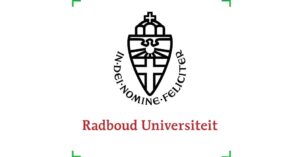Radboud University, Nijmegen, Netherlands invites online Application for number of PhD Positions at various Departments. We are providing a list of Fully Funded PhD Positions available at Radboud University, Nijmegen, Netherlands.
Eligible candidate may Apply as soon as possible.
(01) PhD Position – Fully Funded
PhD position summary/title:–PhD Candidate: The Law and Policy of EU External Climate Action
In light of escalating environmental challenges and mounting calls for action, societies worldwide, including the EU find themselves at a critical juncture, compelled to navigate the complex intersection of environmental stewardship, economic development and social equity. The EU is widely perceived as a global leader in this respect, inter alia due to its strong commitment to multilateralism and promotion of the UN climate change regime. Moreover, the European Green Deal envisages a proactive role for the EU as a ‘global leader’, whereby the latter’s own internal green transition would be a stepping stone for its engagement with its international partners. As a PhD candidate, you will explore the Union’s instruments and methodology designed to assist its partners in fulfilling their obligations under the Paris Agreement, while simultaneously fostering a global ecological transition.
Deadline : 15 May 2024
(02) PhD Position – Fully Funded
PhD position summary/title:–PhD Candidates for Social Studies of Scholarly Communication and Peer Review
The first PhD project mainly involves a quantitative social science study of how the transformative developments affect the content of peer review reports. The study involves a scientometric and quantitative text analysis of peer review reports and their meta data, including reviewer characteristics. These analyses will assess how the tone, length, content and timeliness of review reports varies across different models of peer review. In addition, network analyses will be conducted to assess how the transformative developments shape reviewer communities and social networks.
The second PhD project involves a qualitative social science study of how transformative developments in scholarly communication affect the identities and roles of reviewers. This question will be addressed through qualitative interviews with reviewers. Respondents will be asked about their perception of academic and disciplinary identity, as well as their sense of belonging to epistemic communities, and whether this generates a sense of obligation or loyalty to particular epistemic communities. The interviews subsequently examine whether and how these considerations play a role in respondents’ decisions to accept or reject review invitations. The results of the qualitative interviews will feed into a larger survey to test whether findings generalise across various contexts.
Deadline : 13 May 2024
View more Fully Funded PhD Positions Click Here
(03) PhD Position – Fully Funded
PhD position summary/title:–PhD Candidate: Software Security
Are you an aspiring computer science researcher interested in what can be done to make our digital world more secure? Then you have a part to play as a PhD candidate. By investigating techniques to design, analyse and test software, you will help us develop new, innovative methods to improve software security.
Cyber security problems have increased dramatically over the past decades. Not a day goes by without a major data leak, some system being hacked, or some organisation being ransomwared. This trend only looks set to continue as our society relies on IT to an ever larger degree. Software is an important root cause of cyber security problems: software is what gives modern IT its flexibility and power, but it also comes with flaws, ranging from simple coding mistakes to fundamental design flaws, which enable cyber criminals to exploit all this power and flexibility to attack individuals and organisations.
Deadline : 19 May 2024
(04) PhD Position – Fully Funded
PhD position summary/title:–PhD Candidate: Environmental Microbiology
Are you fascinated by the world of microbiology and environmental sciences? Do you thrive in the dynamic blend of laboratory experiments and fieldwork adventures? If your passion lies in unravelling the mysteries of microbial greenhouse gas emissions and pioneering strategies for their mitigation, then we have an extraordinary opportunity for you.
Embark on an exciting PhD journey where you will explore the fascinating field of anaerobic methane oxidation and its multifaceted environmental implications, unlocking its vast biotechnological potential. This is not just any doctoral position: it is a chance to be at the forefront of groundbreaking research that promises to reshape our understanding of microbial processes in changing ecosystems and pave the way for sustainable solutions.
Deadline : 12 May 2024
(05) PhD Position – Fully Funded
PhD position summary/title:–PhD Candidate: Visual Perception and Decision-Making
A PhD position is available in Dr Janneke Jehee’s lab at the Donders Institute for Brain, Cognition and Behaviour. You will work on studies of visual decision-making, sensory uncertainty, and decision confidence. Research methods include computational modelling, brain imaging (fMRI, MEG), machine learning, behavioural methods, and other techniques.
Virtually every decision we make comes with a sense of confidence – a subjective estimate of decision accuracy. Confidence enables us to monitor and judge the quality of our own decisions and adapt our behaviour accordingly. For example, we reduce speed when driving in bad weather because we are less confident about our estimates of the distance to surrounding traffic. But what makes us feel less confident in these conditions? What brain mechanisms underlie this ability? This project will address these and other questions regarding the neural basis of sensory uncertainty and visual decision confidence.
Deadline : 15 May 2024
(06) PhD Position – Fully Funded
PhD position summary/title:–PhD Candidate: Computational Cognitive Science at the Donders Centre for Cognition
In this PhD project, titled ’Cognitive capacities and machines: Why do calculators exist, if AGI cannot?’, you will adopt various theoretical and meta-theoretical methodologies (including literature review, conceptual engineering and formal analysis) to study and characterise: 1. What are cognitive capacities? 2. What kinds of cognitive capacities, if any, can exist in sociotechnical artefacts and/or is there always a human in the loop? 3. And which epistemologies provide a way out of the conundrum of hyperempiricism, such that we can have a sound and coherent science of cognitive capacities?
Deadline : 22 May 2024
Connect with Us for Latest Job updates
(07) PhD Position – Fully Funded
PhD position summary/title:–PhD Candidate: Audio AI for Technological and Neuroscientific Applications at the Donders Centre for Cognition
Do you have a passion for research and are you interested in audio machine learning for technological and neuroscientific applications? Are you eager to tackle complex problems and to develop creative solutions? Then join the Donders Centre for Cognition as a PhD candidate!
Universal audio embedding models capable of performing a humanlike range of hearing tasks have numerous technological applications (e.g. augmented hearing, assistive hearing technology) as well as neuroscientific applications (e.g. models of neural encoding). This project aims to leverage self-supervised learning approaches to develop universal audio embedding models which are capable of encoding the full complexity of real-world sound scenes, including the spatial dimension. As part of the research group, you will work with experts in machine learning, digital signal processing and computational auditory neuroscience on new algorithms for real-world, spatial audio representation learning.
Deadline : 16 May 2024
(08) PhD Position – Fully Funded
PhD position summary/title:–PhD Candidate in the Cognitive Neuroscience of Subjective Experience at the Donders Centre for Cognition
This PhD project aims to address a primary challenge of consciousness research: to explain phenomenological properties of conscious experience in terms of neural processes. You will investigate how sensory predictions determine individual differences in the subjective experience of colour. You will compare trainees, who generate novel letter-colour predictions by reading books with coloured letters, with developmental synesthetes, who have life-long sensory predictions of colour evoked by letters. Pupil dilation measurements, information theory modelling and fMRI will be used to explore the role of brainstem neuromodulators and the colour-selective visual cortex in shaping the subjective experience of colour, aiming to establish a computational link between neural processes and conscious phenomena.
Deadline : 30 May 2024
(09) PhD Position – Fully Funded
PhD position summary/title:–PhD Candidate: Developing laser-based spectroscopy systems for gas phase contamination detection in real-life applications
As a PhD candidate, you will identify and characterise the major gas-phase contaminants in these two applications, their origins and concentrations. You will do so with the help of leading national and international institutes and companies in the corresponding field. This involves developing new set-ups to mimic the application conditions in the lab and performing measurements in the field at the commercial partners. The goal is to portray a full picture of the major contaminants and finally design efficient and cost-effective new instruments using broadband laser-based spectroscopy for the identified targets.
Deadline : 01 August 2024
(10) PhD Position – Fully Funded
PhD position summary/title:–PhD Candidates: History of Philosophy in the Islamic World (ALIVE project)
Are you a highly motivated aspiring junior researcher? Would you like to work on the history of philosophy in the Islamic world? Do you want to develop your own innovative research ideas as a key member of a research team? The Center for the History of Philosophy and Science (CHPS) of the Faculty of Philosophy, Theology and Religious Studies at Radboud University is looking to appoint two PhD candidates for the duration of four years. One postholder will conduct research on Avicenna’s engagement with the generation of his teachers (PhD project 1) and the other on Avicenna’s engagement with the generation of his own students (PhD project 2).
Deadline : 31 May 2024
View Postdoc Positions Click Here
(11) PhD Position – Fully Funded
PhD position summary/title:–PhD Position in Computational Biology: Using Machine Learning to Understand the Immune System
Are you an aspiring data science researcher with an interest in human immunology, causal inference in dynamical systems, and/or computer vision? Would you like to apply AI and machine learning for fundamental research in biology? Then you have a part to play as a PhD candidate. By combining simulations and machine learning, you will help us develop new, innovative methods to extract knowledge from immune cell movement videos.
When thinking of cells, most people imagine static building blocks. Yet many processes in health and disease critically rely on cell movement. A key example is the defence against viruses and cancer: the cells of our immune system are strikingly motile as they navigate the maze of tissues in the human body, interact and communicate with other cells, search for signs of anomalies, and swarm to sites of infection.
Deadline : 30 May 2024
(12) PhD Position – Fully Funded
PhD position summary/title:–PhD Candidate: Optical Controllable Magnetic Structures for In-memory Computing
All-Optical switching (AOS) of magnetisation has been demonstrated as a radically new approach to write magnetic bits at an unprecedented picosecond timescale and with low switching energies. Recently, we have exploited multi-shot, helicity-dependent AOS and realised opto-magnetic synapses in CoPt films: non-volatile, magnetic memory elements continually adaptable using laser pulses. Key challenges for future neuromorphic and in-memory computing are to develop material systems in which AOS can lead to multi-state switching, can be scaled down to nanometre dimensions, and can be integrated into a photonic network while still retaining the energy efficiency of AOS. Ultimately, this research may lead to breaking down existing computational barriers, paving the way to new scientific discoveries. Although fundamental in nature, our research may, in the long term, stimulate the adoption of neuromorphic hardware for societal applications. You will receive training and perform research and will be part of an interdisciplinary effort involving collaborations with the University of Twente, Technical University Eindhoven, MPI-Halle, Uppsala University, VSPARTICLE and Forschungszentrum Jülich. You will publish the results in leading journals and will also have the chance to participate in national and international schools and conferences.
Deadline : 15 May 2024
(13) PhD Position – Fully Funded
PhD position summary/title:–PhD Candidate: The Early Modern Economic and Social History Research Project ‘Business as Usual: the informal institutions of merchants in the early modern period’
Are you intrigued by the world of early modern merchants? And are you wondering how they made and justified business decisions? Do you want to delve into preserved ‘letter books’ and uncover the norms and customs guiding their decisions? Apply now as a PhD candidate at the Radboud Institute for Culture & History (RICH)!
We offer you the opportunity to develop and carry out your own PhD project within the areas of expertise of your supervisors: Dr Joris van den Tol, Dr Sanne Muurling and Prof. Jan Kok. The project will be funded by a Starters Grant from the Faculty of Arts awarded to Dr Joris van den Tol.
‘Institutions,’ Nobel laureate Douglas North wrote, ‘are the humanly devised constraints that structure political, economic, and social interaction’ (North 1991). Institutions can be formal (e.g. laws, constitutions, property rights) or informal (e.g. taboos, traditions, norms, or customs). To answer the questions why early modern merchants made certain choices and how they shaped, negotiated and used informal institutions, this project studies the representations of European merchants’ norms and values in their correspondence.
Deadline : 16 June 2024
(14) PhD Position – Fully Funded
PhD position summary/title:–PhD Candidate: Integrating Biopsychological Data to Capture Individual Differences at the Donders Centre for Cognition
Do you have a strong interest in developing and studying new tools to integrate neurobiological and/or psychological information to better capture individual differences? Do you have strong communication skills and see yourself working at the intersection of psychology, cognitive neuroscience and computational science? If so, the SAMBA research group has a position for you as a PhD candidate.
The project is embedded in Dr Inti Brazil’s SAMBA research group, part of the Donders Centre for Cognition, which in turn is part of the Donders Institute. The main focus of the group’s research programme is on combining approaches from experimental psychology, cognitive neuroscience (e.g. neuroimaging), computational modelling and statistical modelling methods to study how impairments in neurobiological and psychological functioning underpin antisocial and maladaptive behaviours. The project targets individuals from the general community, psychiatric patient populations, incarcerated offenders, and forensic psychiatric populations. It will be conducted in close collaboration with the UICS group led by Dr Max Hinne.
Deadline : 28 May 2024
(15) PhD Position – Fully Funded
PhD position summary/title:–PhD Candidate in Condensed Matter Physics for the Synthesis of 2D Materials
Recently, two-dimensional (2D) materials, e.g. graphene, have gained much attention in research for their special physical properties compared to their three-dimensional counterparts. Halides or transition metal dichalcogenides in particular, but also many other material compounds, show great potential for future device applications because of their special superconducting, magnetic or transport properties. However, typically these materials are very reactive and deteriorate quickly under ambient conditions or even in the dry atmosphere of a glove box.
Your goal will be to establish a new synthesis method and subsequently investigate these materials using local probes at ultra-low temperatures, including scanning probe microscopy and magneto-transport. Using these newly developed material systems, you will investigate physical phenomena such as superconductivity, charge transport, and unconventional memory/computing. Your teaching load may be up to 10% of your working time
Deadline : 09 June 2024
(16) PhD Position – Fully Funded
PhD position summary/title:–PhD Candidate: Neurocognitive Mechanisms of Alternative Thinking at the Donders Centre for Cognition
This project aims to understand the neurocognitive relation between the development of referential communication and emotional action control, testing the hypothesis that both rely on the capacity of generating different hypothetical scenarios with different action options, and that this capacity (’alternative thinking’) can be differentiated from other instances of cognitive flexibility. The project harnesses natural developmental variations in the emergence of communicative skills and emotional action control to gain insight into the role and mechanisms of alternative thinking. By embedding participants in live interactions with other human agents, this project will study alternative thinking in an experimental context closer to the boundary conditions of the problems the brain evolved to solve, testing the possibility of explaining superficially different phenomena by means of a single cognitive capacity.
Deadline : 24 May 2024
About Radboud University, Nijmegen, Netherlands –Official Website
Radboud University is a public research university located in Nijmegen, Netherlands. The university bears the name of Saint Radboud, a 9th century Dutch bishop who was known for his intellect and support of the underprivileged.
Established in 1923, Radboud University has consistently been included in the top 150 of universities in the world by four major university ranking tables. As of 2020, it ranks 105th in the Shanghai Academic Ranking of World Universities. Internationally, RU is known for its strong research output. In 2019, 447 PhD degrees were awarded, and 7.571 scientific articles were published. To bolster the international exchange of academic knowledge, Radboud University joined the Guild of European Research-Intensive Universities in 2016.
Located on a green campus in the southern Heyendaal neighbourhood of Nijmegen, the campus houses 7 faculties that conduct teaching and research in Arts, Law, Management, Medical Sciences, Social Sciences and Theology, Philosophy and Religious Studies. In addition to these faculties, the campus also hosts the Max Plank Institute for Psycholinguistics, a world class research centre devoted to the understanding of human language and communication.
Disclaimer: We try to ensure that the information we post on PhdNest.com is accurate. However, despite our best efforts, some of the content may contain errors. You can trust us, but please conduct your own checks too.
Related Posts
- 19 Fully Funded PhD Positions at KTH Royal Institute of Technology, Stockholm, Sweden
- 09 Fully Funded PhD Positions at Karolinska Institute, Sweden
- 10 Fully Funded PhD Positions at Umea University, Sweden
- 19 Fully Funded PhD Positions at Uppsala University, Sweden
- 23 Fully Funded PhD Positions at Swansea University, Wales, United Kingdom
- 04 Fully Funded PhD Positions at Brunel University, London, England
- 13 Fully Funded PhD Positions at Cranfield University, England
- 14 Fully Funded PhD Positions at Linkoping University, Sweden
- 03 Fully Funded PhD Positions at University of Freiburg, Germany
- 12 Fully Funded PhD Positions at Aalborg University, Denmark
- 06 Fully Funded PhD Positions at EMPA, Zurich, Switzerland
- 23 Fully Funded PhD Positions at Ghent University, Belgium













